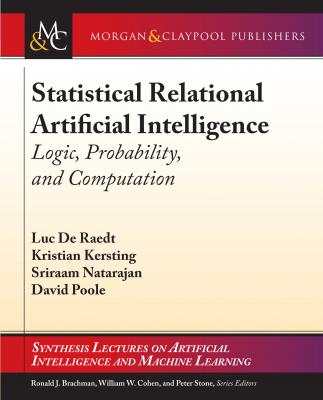Statistical Relational Artificial Intelligence. Luc De Raedt
Чтение книги онлайн.
Читать онлайн книгу Statistical Relational Artificial Intelligence - Luc De Raedt страница 2

A Concise Introduction to Multiagent Systems and Distributed Artificial Intelligence
Nikos Vlassis
2007
Intelligent Autonomous Robotics: A Robot Soccer Case Study
Peter Stone
2007
Copyright © 2016 by Morgan & Claypool
All rights reserved. No part of this publication may be reproduced, stored in a retrieval system, or transmitted in any form or by any means—electronic, mechanical, photocopy, recording, or any other except for brief quotations in printed reviews, without the prior permission of the publisher.
Statistical Relational Artificial Intelligence: Logic, Probability, and Computation
Luc De Raedt, Kristian Kersting, Sriraam Natarajan, and David Poole
www.morganclaypool.com
ISBN: 9781627058414 paperback
ISBN: 9781627058421 ebook
DOI 10.2200/S00692ED1V01Y201601AIM032
A Publication in the Morgan & Claypool Publishers series
SYNTHESIS LECTURES ON ARTIFICIAL INTELLIGENCE AND MACHINE LEARNING
Lecture #32
Series Editors: Ronald J. Brachman, Yahoo! Labs
William W. Cohen, Carnegie Mellon University
Peter Stone, University of Texas at Austin
Series ISSN
Print 1939-4608 Electronic 1939-4616
Statistical Relational Artificial Intelligence
Logic, Probability, and Computation
Luc De Raedt
KU Leuven, Belgium
Kristian Kersting
Technical University of Dortmund, Germany
Sriraam Natarajan
Indiana University
David Poole
University of British Columbia
SYNTHESIS LECTURES ON ARTIFICIAL INTELLIGENCE AND MACHINE LEARNING #32
ABSTRACT
An intelligent agent interacting with the real world will encounter individual people, courses, test results, drugs prescriptions, chairs, boxes, etc., and needs to reason about properties of these individuals and relations among them as well as cope with uncertainty.
Uncertainty has been studied in probability theory and graphical models, and relations have been studied in logic, in particular in the predicate calculus and its extensions. This book examines the foundations of combining logic and probability into what are called relational probabilistic models. It introduces representations, inference, and learning techniques for probability, logic, and their combinations.
The book focuses on two representations in detail: Markov logic networks, a relational extension of undirected graphical models and weighted first-order predicate calculus formula, and Problog, a probabilistic extension of logic programs that can also be viewed as a Turing-complete relational extension of Bayesian networks.
KEYWORDS
probabilistic logic models, relational probabilistic models, lifted inference, statistical relational learning, probabilistic programming, inductive logic programming, logic programming, machine learning, Prolog, Problog, Markov logic networks
Contents
1.1 Uncertainty in Complex Worlds
1.2 Challenges of Understanding StarAI
1.3 The Benefits of Mastering StarAI
2 Statistical and Relational AI Representations
2.1 Probabilistic Graphical Models
2.1.2 Markov Networks and Factor Graphs
2.2 First-Order Logic and Logic Programming
3 Relational Probabilistic Representations
3.1 A General View: Parameterized Probabilistic Models
3.2 Two Example Representations: Markov Logic And ProbLog
3.2.1 Undirected Relational Model: Markov Logic
3.2.2 Directed Relational Models: ProbLog